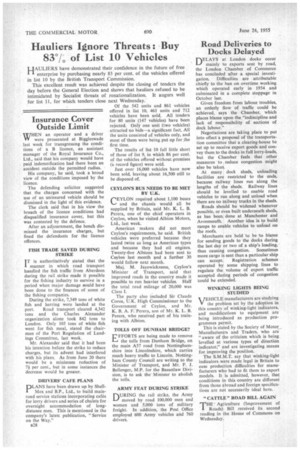Road Deliveries to Docks Delayed
Page 36

If you've noticed an error in this article please click here to report it so we can fix it.
DELAYS at London docks °CCM mainly to exports sent by road, the London Chamber of Commerce has concluded after a special investigation, Difficulties are attributable chiefly to the ban on overtime working which operated early in 1954 and culminated in a complete stoppage in October last.
Given freedom from labour troubles, an orderly flow of traffic could be achieved, says the Chamber, which places blame upon the "indiscipline and lack of responsibility of sections of dock labour."
Negotiations are taking place to put into effect a proposal of the transportation committee that a clearing-house be set up to receive export goods and convey them to the docks in full lorry-loads, but the Chamber feels that other measures to reduce congestion might also be taken.
At many dock sheds, unloading facilities are restricted to the ends, because railway lines run along the lengths of the sheds. Railway lines should be levelled to enable road vehicles to run along and unload when there are no railway trucks in the sheds.
Roads should be widened whenever possible, or even built underneath sheds, as has been done at Manchester and Avonmouth. Another idea is to build ramps to enable vehicles to unload on the roofs.
Merchants are held to be 'to blame for sending goods to the docks during the last day or two of a ship's loading, thus causing congestion. Sometimes more cargo is sent than a particular ship can accept. Registration schemes operated by some shipping lines to regulate the volume of export traffic accepted during periods of congestion could be extended.
WINKING LIGHTS BEING STUDIED VEHICLE manufacturers are studying V the problem set by the adoption in this country of winking-light indicators, and modifications to equipment are being introduced as production programmes permit. This is stated by the Society of Motor Manufacturers and Traders, who are "aware of the criticism which is being levelled at various types of direction indicator," and are investigating means for improving the position.
The S.M.M.T. say that winking-light indicators were made legal in Britain to ease production difficulties for manufacturers who had to fit them to export models. It is admitted, however, that conditions in this country are different from those abroad and foreign specifications are not necessarily ideal here.
" CATTLE " ROAD BILL AGAIN
THEAgriculture (Improvement of Roads) Bill received its second reading in the House of Commons on Wednesday.








































































































